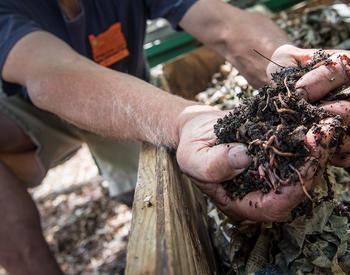Q:
Can fireplace ash be used in the garden successfully or is it harmful to the soil?
A:
Wood ash is a fine source of soluble phosphorus and potassium, both of which are essential plant nutrients. As with all things, however, the dose makes the poison.
- Sift as to remove the big chunks before applying. A scrap of hardware cloth (say, 1/4" or 1/2 " would be fine - window screening is too fine.)
- Limit ash applications to 10 pounds per 100 square feet per year. NOT MORE.
- Apply about 2 weeks before you plant. Don't apply during the winter, as the phosphorus and potassium - highly soluble - may wash away before there are growing plants to take it up.
- If you are applying wood ash on an annual basis, be sure to check the pH of the soil. It may be that your local Master Gardener group offers this service at the county office or at a clinic.
- If wood is your only heat source, you can easily generate more ash in the heating season than a typical home garden can absorb.
Too much ash can increase the soil pH to levels that interfere with plant growth. Repeated, heavy applications to the same spot (as if you used one corner of the yard as an ash dump) can effectively sterilize soil and threaten surface water quality.
Ash can be applied to lawns in much the same way that lime is used to maintain adequate pH. The larger area typical of lawns prevents most of the problems discussed here.
Want to learn more about this topic? Explore more resources from OSU Extension: Garden Soil and Compost
Was this page helpful?
Related Content from OSU Extension
How to Use Compost in Gardens and Landscapes
Compost is a soil amendment consisting of partially broken-down organic material. Use compost to improve soil for vegetable gardens, landscape areas and lawns. Learn how to apply the correct amount of compost and how to avoid common compost mistakes.
Weston Miller | Feb 2021 | OSU Extension Catalog Peer reviewed (Orange level)
Sand, silt or clay? Texture says a lot about soil
Texture determines all kinds of things like drainage, aeration, the amount of water the soil can hold, erosion potential and even the amount of nutrients that can be stored.
Kym Pokorny | Sep 3, 2021 | News story
Improving Garden Soils with Organic Matter
This publication will help you understand the importance of soil organic matter levels to good plant performance. It also contains suggestions for suitable soil amendments. Any soil, no matter how compacted, can be improved by ...
Neil Bell, Dan M. Sullivan, Linda Brewer | May 2003 | OSU Extension Catalog Peer reviewed (Orange level)
Willamette Valley Soil Quality Card
Use in conjunction with the Willamette Valley Soil Quality Card Guide (EM 8710), which includes detailed information about each indicator listed on the Soil Quality Card. Designed to assess current soil quality conditions, record ...
Jun 1998 | OSU Extension Catalog Peer reviewed (Orange level)
The Mulch Mystery
Lesson plans for an eight-session 4th or 5th grade class experiment to be conducted both in the classroom and at a field site. Explores the best method for getting rid of invasive plants by testing various mulch treatments, ...
Aug 2007 | OSU Extension Catalog Peer reviewed (Orange level)
Soil Test Interpretation Guide
This publication provides an overview of soil testing and general guidelines for interpreting soil test results for nitrogen, phosphorus, sulfur, potassium, calcium, magnesium, boron, zinc, copper, manganese, iron, molybdenum, chloride, ...
Dan M. Sullivan | Jul 2011 | OSU Extension Catalog Peer reviewed (Orange level)
Composting with Worms
This publication provides step-by-step methods for successful worm composting at home. It includes a concise explanation of specific worm physiology, kinds of bins to use and how to set them up, what to feed the worms, how to...
Sam Angima | Oct 2011 | OSU Extension Catalog Peer reviewed (Orange level)
Coffee Grounds and Composting
Coffee grounds are a great addition to the garden and compost pile. Help to recycle this great organic resource and reduce the amount of organics going to the landfill!
Jun 2018 | Article
Have a question? Ask an Expert!
Ask an Expert is a way for you to get answers from the Oregon State University Extension Service. We have experts in family and health, community development, food and agriculture, coastal issues, forestry, programs for young people, and gardening.
Ask us a question
Are Ashes Good For A Garden
Source: https://extension.oregonstate.edu/ask-expert/featured/are-ashes-good-my-soil
Posted by: kittrellkitn1938.blogspot.com


0 Response to "Are Ashes Good For A Garden"
Post a Comment